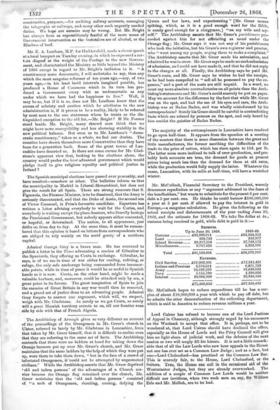Lord Cairns has refused to become one of the Lord
Justices of Appeal in Chancery, although strongly urged by his successors on the Woolsack to accept that office. It is, perhaps, not to be wondered at, that Lord Cairns should have declined the office, especially as the House of Lords and the Privy Council will give him no light share of judicial work, and the debates of the next session or two will amply fill his leisure. It is not a little remark- able that of all the Law Lords who now hear appeals in the House not one has ever sat as a Common Law Judge ; and as a fact, but one—Lord Chelmsford—has practised at the Common Law Bar. This is scarcely fair, to the House, Lord Chelmsford, or the • Suitors. True, the House can call in the occasional aid of the Westminster Judges, but they are already overworked. The addition of a couple of Common Law Lords would be neither difficult nor invidious, when two such men as, say, Sir William Erle and Mr. Mellish, are to be had.


































 Previous page
Previous page